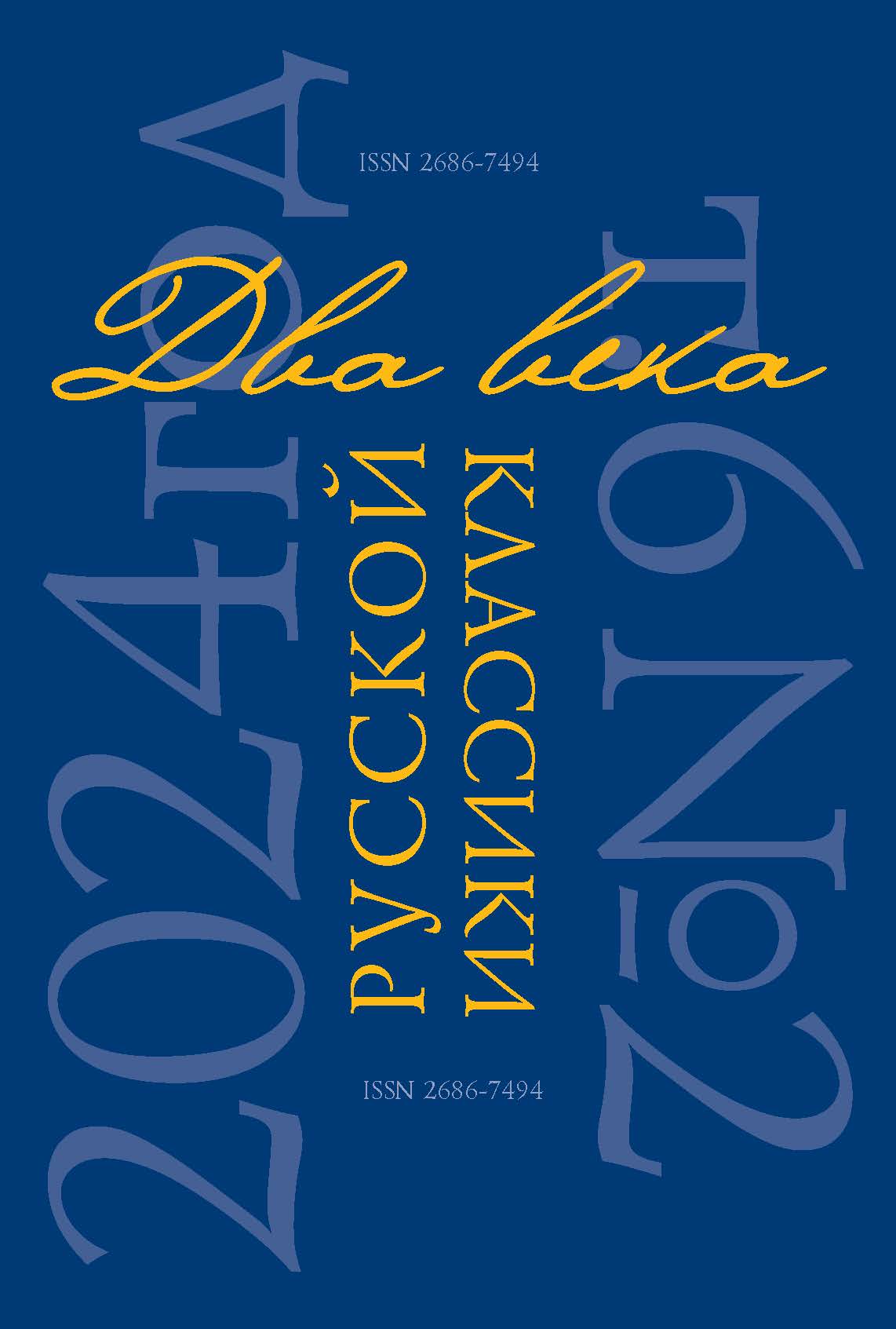Acknowledgments:
The work was carried with financial support of the Russian Science Foundation, project no. № 23-28-01302 “Methodology of the axiological approach to the study of Russian literature by A. A. Ukhtomsky and D. I. Chizhevsky” (https://rscf.ru/project/23-28-01302/).
Abstract:
Based on the ethical teaching of the religious thinker A. A. Ukhtomsky, the article traces and comprehends the development of the type of the Dreamer and Underground Hero in Lermontov and Dostoevsky’s stories and novels. Lermontov creates the image of the artist Lugin as a Dreamer (“Stoss”), and in the character traits of Krasinsky and Pechorin (“Princess Ligovskaya”), the features of the Underground Hero appear. In the work of Dostoevsky, the Dreamer appears not only in the story “White Nights,” but also in the story “Little Hero,” the story “Netochka Nezvanova.” The Underground Hero of Dostoevsky is depicted in the story “Notes from the Underground” and the novel “The Teenager.” The dreamers of both writers are immersed in the world of literature, music, theater, which develops their imagination. However, the characters of Dostoevsky, unlike Lermontov’s one, are able to commit an act and influence reality.
References
Bakhtin, M. M. “K istoricheskoi tipologii romana” [“On the Historical Typology of the Novel”]. Bakhtin, M. M. Estetika slovesnogo tvorchestva [Aesthetics of Verbal Creativity]. Moscow, Iskusstvo Publ., 1979, pp. 199–209. (In Russ.)
Bocharov, S. G. “Otkryvatel’ verkhnego riada russkoi prozy” [“The Discoverer of the Upper Row of Russian Prose”]. Virolainen, M. N., and A. A. Karpova, editors. Mir Lermontova: kollektivnaia monografiia [The World of Lermontov: A Collective Monograph]. St. Petersburg, Skriptorium Publ., 2015, pp. 434–442. (In Russ.)
Bulanov, A. M. Khudozhestvennaia fenomenologiia izobrazheniia “serdechnoi zhizni” v russkoi klassike (A. S. Pushkin, M. Iu. Lermontov, I. A. Goncharov, F. M. Dostoevskii, L. N. Tolstoi) [Artistic Phenomenology of the Image of “Heart Life” in Russian Classics (A. S. Pushkin, M. Yu. Lermontov, I. A. Goncharov, F. M. Dostoevsky, L. N. Tolstoy)]. Volgograd, Peremena Publ., 2003. 191 p. (In Russ.)
Valagin, A. P. “Chital li Dostoevskii ʽKniaginiu Ligovskuiu’?” [“Did Dostoevsky Read ʽPrincess Ligovskaya’?”]. Dostoevskii. Materialy i issledovaniia [Dostoevsky. Materials and Research], vol. 3. Leningrad, Nauka Publ., 1978, pp. 205–208. (In Russ.)
Vlaskin, A. P., and T. B. Zaitseva. “Aksiologicheskoe soderzhanie romana M. Iu. Lermontova ʽGeroi nashego vremeni’.” [“The Axiological Content of M. Yu. Lermontov’s Novel ʽA Hero of Our Time’.”]. Gumanitarno-pedagogicheskie issledovaniia, vol. 1, no. 1, 2017, pp. 108–114. (In Russ.)
Givens, Dzh. Obraz Khrista v russkoi literature: Dostoevskii, Tolstoi, Bulgakov, Pasternak [The Image of Christ in Russian Literature: Dostoevsky, Tolstoy, Bulgakov, Pasternak]. St. Petersburg, Academic Studies Press, 2021. 351 p. (In Russ.)
Gigolov, M. G. “Lermontovskie motivy v tvorchestve F. M. Dostoevskogo” [“Lermontov’s Motifs in F. M. Dostoevsky’s Works”]. Dostoevskii. Materialy i issledovaniia [Dostoevsky. Materials and Research], vol. 7. Leningrad, Nauka Publ., 1985, pp. 64–72. (In Russ.)
Zakharov, V. N. “ʽSmelost’ izobreteniia’: v romane M. Iu. Lermontova ʽGeroi nashego vremeni’.” [“ʽCourage of Invention’: In the Novel by M. Yu. Lermontov ʽA Hero of Our Time’.”]. Problemy istoricheskoi poetiki, no. 12, 2014, pp. 18–33. (In Russ.)
Isupov, K. G. “O metafizike Lermontova” [“On Lermontov’s Metaphysics”]. Virolainen, M. N., and A. A. Karpov, editors. Mir Lermontova: kollektivnaia monografiia [Lermontov’s World: A Collective Monograph]. St. Petersburg, Skriptorium Publ., 2015, pp. 42–50. (In Russ.)
Krinitsyn, A. B. Ispoved’ podpol’nogo cheloveka: K antropologii Dostoevskogo [Confessions of an Underground Man: On the Anthropology of Dostoevsky]. Moscow, Dialog MGU: MAKS Press, 2001. 370 p. (In Russ.)
Naidich, E. E. “Eshche raz o ʽShtosse’.” [“Once Again about ʽShtoss’.”]. Lermontovskii sbornik [Lermontov’s Collection]. Leningrad, Nauka Publ., 1988, pp. 194–212. (In Russ.)
Odinokov, V. G. Tipologiia obrazov v khudozhestvennoi sisteme F. M. Dostoevskogo [Typology of Images in the Artistic System of F. M. Dostoevsky]. Novosibirsk, Nauka Publ., 1981. 144 p. (In Russ.)
Osmolovskii, O. N. F. M. Dostoevskii i russkii roman XIX v. [F. M. Dostoevsky and the Russian Novel of the 19th Century]. Orel, Orel State University Publ., 2001. 336 p. (In Russ.)
Siladi, Zhofiia. “Tainy Pechorina (Semanticheskaia struktura obraza geroia v romane M. Iu. Lermontova)” [“Secrets of Pechorin (The Semantic Structure of the Character’s Image in M. Yu. Lermontov’s Novel)”]. Slavica tergestina, no. 3, 1995, pp. 55–71. (In Russ.)
Skaftymov. A. P. Poetika khudozhestvennogo proizvedeniia [Poetics of a Work of Art]. Moscow, Vysshaia shkola Publ., 2007. 535 p. (In Russ.)
Slivitskaia, O. V. “ʽIdeal’naia vstrecha’: Lermontov i Lev Tolstoi” [“ʽPerfect Meeting’: Lermontov and Leo Tolstoy”]. Virolainen, M. N., and A. A. Karpov, editors. Mir Lermontova: kollektivnaia monografiia [Lermontov’s World: A Collective Monograph]. St. Petersburg, Skriptorium Publ., 2015, pp. 51–67. (In Russ.)
Sokolova, L. V. A. A. Ukhtomskii i kompleksnaia nauka o cheloveke [A. A. Ukhtomsky and the Complex Science on Human]. St. Petersburg, St. Petersburg University Publ., 2010. 316 p. (In Russ.)
Udodov, B. T. “Geroi nashego vremeni” [“The Hero of Our Time”]. Manuilov, V. A., editor. Lermontovskaia entsiklopediia [Lermontov Encyclopedia]. Moscow, Sovetskaia entsiklopediia Publ., 1981, pp. 101–111. (In Russ.)
Ukhtomskii, A. A. Dominanta [Dominant]. St. Petersburg, Piter Publ., 2020. 512 p. (In Russ.)
Fedorova, E. A. “Dominanta dushi i khronotop Raskol’nikova: ot ʽDvoinika’ k ʽSobesedniku’ (po A. Ukhtomskomu)” [“Dominant of the Soul and Raskolnikov’s Chronotope: From the ʽDouble’ to the ʽInterlocutor’ (According to A. Ukhtomsky)”]. Sotsial’nye i gumanitarnye znaniia, vol. 2, no. 4 (8), 2016, pp. 327–332. (In Russ.)
Khrabrova, A. V. “Poisk zhanra v povestiakh ʽShtoss’ i ʽKhoziaika’: k problem tvorcheskogo vzaimodeistviia pozdnego Lermontova i rannego Dostoevskogo” [“The Search for a Genre in the Stories ʽStoss’ and ʽThe Mistress’: To the Problem of Creative Interaction between Late Lermontov and Early Dostoevsky”]. Vestnik Tomskogo universiteta, no. 366, 2013, pp. 16–19. (In Russ.)
Shmid, V. Narratologiia [Narratology]. Moscow, Iazyki slavianskoi kul’tury Publ., 2008. 302 p. (In Russ.)
Holk, Andre G. F. Van. “O glubinnoi strukture Pechorina” [“On the Deep Structure of Pechorin”]. Russian literature, vol. 31, no. 4, 1992, pp. 545–555. (In Russ.)









